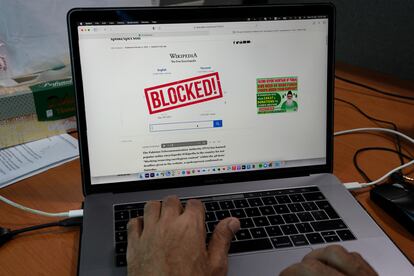Pakistan blocks Wikipedia, says it hurts Muslim sentiments
Under Pakistan’s controversial blasphemy laws, anyone found guilty of insulting Islam or its figures can be sentenced to death

Pakistan’s media regulator said Monday it blocked Wikipedia services in the country for hurting Muslim sentiment by not removing purportedly blasphemous content from the site. Critics denounced Islamabad’s action, saying it was a blow to digital rights.
Under Pakistan’s controversial blasphemy laws, anyone found guilty of insulting Islam or its figures can be sentenced to death, although the country has yet to carry out capital punishment for blasphemy.
But even allegations of the offense are often enough to provoke mob violence and even deadly attacks. International and domestic rights groups say that accusations of blasphemy have often been used to intimidate religious minorities and settle personal scores.
The Pakistan Telecommunication Authority says it blocked Wikipedia because a 48-hour deadline to remove the content was ignored, according to a spokesperson. “Such things hurt the sentiments of Muslims,” said Malahat Obaid, from the regulator.
She said Pakistani authorities are in talks with Wikipedia officials and the ban could be lifted if the platform completely removes anti-Islam content.
The Wikimedia Foundation on Saturday confirmed the ban, saying: “We hope that the Pakistan government joins us in a commitment to knowledge as a human right and restores access to @Wikipedia and Wikimedia projects promptly, so that the people of Pakistan can continue to receive and share knowledge with the world.”
Mohsin Raza Khan, a Pakistani social media expert, said it is easy to update or replace Wikipedia material deemed sacrilegious or offensive for Muslims – so blocking the site is not the answer.
“Pakistan’s media regulator and other authorities should try to find some viable technical solution to such problems as blasphemous content is available everywhere,” he said. “It is equal to a drop in the ocean of knowledge.”
The Lahore-based Digital Rights Foundation earlier called the Wikipedia ban an affront to Pakistanis’ right to access information and a mockery of the country’s commitment to uphold its human rights obligations.
In the past, Pakistan briefly banned TikTok twice for allegedly uploading “immoral, obscene and vulgar” content.
But the ban was later lifted after TikTok assured Pakistan it would remove immoral content and also block users who upload “unlawful content.” The app was downloaded millions of times in Pakistan when the ban was imposed in 2020 and 2021.
Also, in 2008, Pakistan banned YouTube over videos depicting Prophet Muhammad. Muslims generally believe any physical depiction of Islam’s prophet is blasphemous.
Also on Monday, Amir Mahmood, spokesman for Pakistan’s Ahmadi community, sought protection from the government, saying unidentified Islamists in multiple separate attacks have damaged Ahmadi places of worship in southern Sindh province and elsewhere in the country.
“The freedom of worship given to us by the constitution is shrinking,” he told The Associated Press.
The attacks, which took place over several days, caused no casualties, Mahmood said.
The Ahmadi faith was established on the Indian subcontinent in the 19th century by Mirza Ghulam Ahmad, whose followers believe he was the messiah that was promised by the Prophet Muhammad.
Pakistan’s parliament declared Ahmadis non-Muslims in 1974. Since then, they have repeatedly been targeted by Islamic extremists in the Muslim-majority nation, drawing international condemnation.
Sign up for our weekly newsletter to get more English-language news coverage from EL PAÍS USA Edition
Tu suscripción se está usando en otro dispositivo
¿Quieres añadir otro usuario a tu suscripción?
Si continúas leyendo en este dispositivo, no se podrá leer en el otro.
FlechaTu suscripción se está usando en otro dispositivo y solo puedes acceder a EL PAÍS desde un dispositivo a la vez.
Si quieres compartir tu cuenta, cambia tu suscripción a la modalidad Premium, así podrás añadir otro usuario. Cada uno accederá con su propia cuenta de email, lo que os permitirá personalizar vuestra experiencia en EL PAÍS.
¿Tienes una suscripción de empresa? Accede aquí para contratar más cuentas.
En el caso de no saber quién está usando tu cuenta, te recomendamos cambiar tu contraseña aquí.
Si decides continuar compartiendo tu cuenta, este mensaje se mostrará en tu dispositivo y en el de la otra persona que está usando tu cuenta de forma indefinida, afectando a tu experiencia de lectura. Puedes consultar aquí los términos y condiciones de la suscripción digital.








































